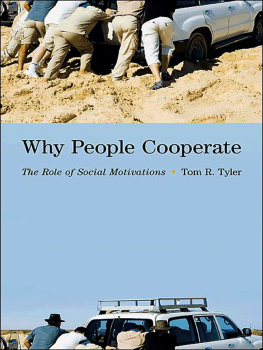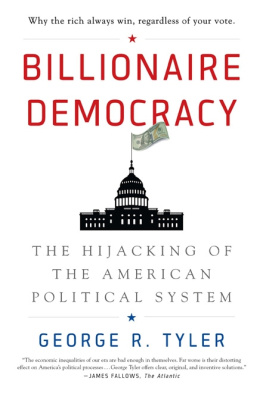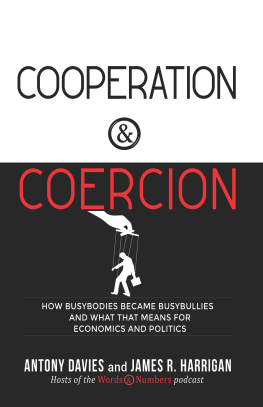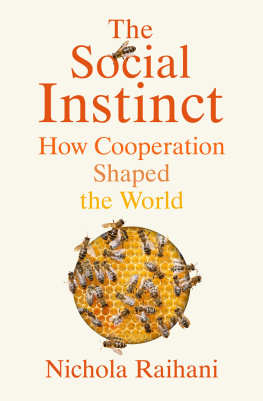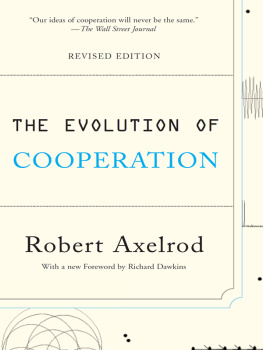Tyler - Why people cooperate: the role of social motivations
Here you can read online Tyler - Why people cooperate: the role of social motivations full text of the book (entire story) in english for free. Download pdf and epub, get meaning, cover and reviews about this ebook. City: Princeton, year: 2013, publisher: Princeton University Press, genre: Politics. Description of the work, (preface) as well as reviews are available. Best literature library LitArk.com created for fans of good reading and offers a wide selection of genres:
Romance novel
Science fiction
Adventure
Detective
Science
History
Home and family
Prose
Art
Politics
Computer
Non-fiction
Religion
Business
Children
Humor
Choose a favorite category and find really read worthwhile books. Enjoy immersion in the world of imagination, feel the emotions of the characters or learn something new for yourself, make an fascinating discovery.
Why people cooperate: the role of social motivations: summary, description and annotation
We offer to read an annotation, description, summary or preface (depends on what the author of the book "Why people cooperate: the role of social motivations" wrote himself). If you haven't found the necessary information about the book — write in the comments, we will try to find it.
Why people cooperate: the role of social motivations — read online for free the complete book (whole text) full work
Below is the text of the book, divided by pages. System saving the place of the last page read, allows you to conveniently read the book "Why people cooperate: the role of social motivations" online for free, without having to search again every time where you left off. Put a bookmark, and you can go to the page where you finished reading at any time.
Font size:
Interval:
Bookmark:

Copyright 2011 by Princeton University Press
Published by Princeton University Press, 41 William Street,
Princeton, New Jersey 08540
In the United Kingdom: Princeton University Press, 6 Oxford Street,
Woodstock, Oxfordshire OX20 1TW
press.princeton.edu
All Rights Reserved
Library of Congress Cataloging-in-Publication Data
Tyler, Tom R.
Why people cooperate : the role of social motivations / Tom R. Tyler.
p. cm.
Includes bibliographical references and index.
ISBN 978-0-691-14690-4 (hardcover : alk. paper)
1. Motivation (Psychology)Social aspects. I. Title.
BF503.T955 2010
302.14dc22 2010005109
British Library Cataloging-in-Publication Data is available
This book has been composed in Bodoni
Printed on acid-free paper.
Printed in the United States of America
10 9 8 7 6 5 4 3 2 1
Figures
Tables
The preparation of this volume was facilitated by talks given at the Program on Negotiation at Harvard University, the Department of Sociology at the University of Washington, the Ethics Center at Stanford University, the Society for Experimental Social Psychology, and the Woodrow Wilson School at Princeton University. I thank the many people who contributed to the volume by making comments on drafts; these include John Darley, Jeffrey Fagan, and Dale Miller as well as several anonymous reviewers. The collection of the panel data on employees was supported by the Alfred P. Sloan Foundation Program in Business Organizations. I thank Gail Pesyna for her support on that project. The panel data on community residents of the police was supported by grants from the National Institute of Justice and the Law and Social Science Program of the National Science Foundation. The Afrobarometer data on political evaluations in Africa was collected as part of a joint enterprise of Michigan State University, the Institute for Democracy in South Africa, and the Centre for Democracy and Development in Ghana. For more information on the Afrobarometer, see www.afrobarometer.org.
What connects people to groups, organizations, and societies? Why do people under some conditions throw their lot in with others and act on behalf of collectivities rather than pursuing their personal self-interest, while in other situations it is difficult or even impossible to motivate such cooperative efforts and people intently pursue their personal self-interest? In other words, what are the reasons that people have for cooperating with others when they are in a group, organization, community, or society? Answering this question is central to all of the social sciences.
A natural tendency, widely found in social psychology as well as in sociology, political science, economics, management, law, and public policy, is to view people as primarily relating to groups instrumentallythat is, cooperating to the degree that others are seen as potential sources of material rewards and/or material costs. Rewards and costs can potentially be thought of in many ways, but are frequently framed in terms of the type of rewards and costs associated with monetary gains or losses. Closely associated to this framing of rewards and costs are the physical pleasures associated with obtaining material rewards or the pain of experiencing material losses. One reason for joining with others in groups is to be better able to obtain rewards and avoid costs and to the extent that people are motivated in this way their relationship is linked to the degree to which they view their potential resource exchanges with others as personally beneficial.
This book argues that the core motivation shaping peoples relationships with others is not of this material type. While not denying the importance of material rewards and costs, it is argued that for most people, most of the time, the connections dominating their relationship with others are related to social links. And, in particular, it is suggested that the extent to which people are motivated to act on behalf of others, cooperating with groups, organizations, and societies, rather than pursuing self-interested objectives, is defined by the nature and strength of peoples social connections to others.
What are the social links that connect people to others? They are long-term connections to groups that are based upon attitudes, emotional connections, shared identities, common values, trust in the character and motivations of others, and a joint commitment to using fair procedures to exercise authority and make decisions. All of these connections share a linkage based upon social ties and are distinct from concerns about personal material gains and losses. Of course, material gains and losses are also important. However, it will be argued that the core factors shaping cooperation, especially voluntary cooperation, are social. Because of the centrality of social motivations to cooperation it will be further argued that the viability of groups, organizations, and societies is linked to the ability of groups to create and sustain supportive social motivations among their members.
While I argue that social links underlie peoples behavior across all types of social settings, the strength of that motivation is often most obvious in situations in which people cooperate when that cooperation makes little sense in terms of the personal rewards and costs they are facing. When the risks of cooperation are high and the likelihood of gains seems remote, it is hard to understand peoples willingness to act on behalf of collectivities.
Consider a common problematic situation, risking injury or death to fight for ones country. Although coercion in the form of conscription is common in such situations, and in conflict situations there are risks associated with shirking from battle, as well as with fighting, it is striking how often people are motivated by their social connections to their group to take risks for their group. As an example, in his well-known book about the American revolution David McCullough describes George Washingtons efforts to hold the American army together in the face of seemingly overwhelming odds of defeat by the British. Washington did so by appealing to identity and values, arguing that if the soldiers would stay they would render that service to the cause of liberty, and to your country, which you can probably never do under other circumstance (McCullough 2005, 286). Similarly, in Henry V, William Shakespeare imagines the king, prior to the Battle of Agincourt, appealing to common identity, saying we few, we happy few, we band of brothersfor whoever sheds his blood with me today shall be my brother (act 4, scene 3).
Efforts to inspire voluntary commitment of the type outlined are important because the only obedience worth soliciting and maintaining [from soldiers] is one born of love not fear. It is not money, legislation, or conscriptionbut the peoples attachment to their government from the sense of the deep stake they have in such a glorious institution. This type of obedience is freely given and inspired by love of country (Samet 2004, 7). Consequently, it is valuable to the group, which does not have toand in these dire moments cannotcreate incentives or credible punishments sufficient to motivate desired behavior. As McCullough makes clear, the revolutionary soldiers who were inspired by Washingtons plea well understood that they faced great risks and hardships that many anticipated (correctly) they would not survive. A rational actor would not have stayed. This emphasis on socially motivated commitment and on the willing exercise of voluntary initiative in fighting (taking risks) for ones country that exists in democratic culture is generally credited with the superior military effectiveness of democratic armies (Reiter and Stam 2002).
Font size:
Interval:
Bookmark:
Similar books «Why people cooperate: the role of social motivations»
Look at similar books to Why people cooperate: the role of social motivations. We have selected literature similar in name and meaning in the hope of providing readers with more options to find new, interesting, not yet read works.
Discussion, reviews of the book Why people cooperate: the role of social motivations and just readers' own opinions. Leave your comments, write what you think about the work, its meaning or the main characters. Specify what exactly you liked and what you didn't like, and why you think so.

